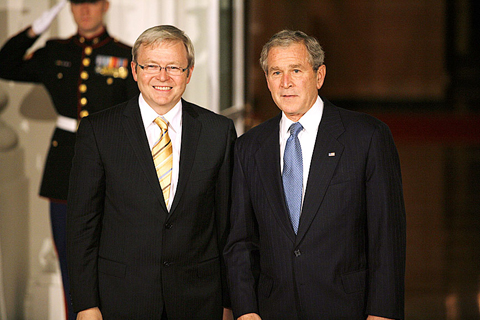World leaders prepared to adopt an early warning system for financial calamities, a commitment to tougher accounting rules and other modest steps to try to prevent crises like the one now threatening the livelihoods of billions of people around the globe.
Nearly two dozen leaders dined in extravagance at the White House on Friday in a prelude to negotiations yesterday over how best to wrestle global economies back from the brink of economic disaster.
The leaders were on track to approve measures to make the world financial system more accountable to investors and more transparent to regulators, said diplomatic sources, speaking on condition of anonymity. To do so, the leaders were expected to endorse more effective accounting rules governing how companies value their assets, a weakness seen as partly responsible for the current financial crisis.

PHOTO: BLOOMBERG
A new early warning system would look for signs of burgeoning problems like those in the US housing market and related overuse of mortgage-backed securities. On Friday, the heads of the IMF, the world’s financial firefighter, and the Financial Stability Forum, a group that includes central banks and major financial regulators, said they would cooperate on “early warning exercises” to detect vulnerabilities.
Bush gave Australian Prime Minister Kevin Rudd a less than warm welcome at the White House dinner amid controversy over a leaked conversation between them, a report said yesterday.
Bush “appeared somewhat standoffish” as he greeted Rudd, the Australian Associated Press reported from Washington.
At the heart of the controversy is a claim in an Australian newspaper last month that Bush displayed embarrassing ignorance by asking Rudd in a telephone call about the crisis: “What’s the G20?”
The allegation has been denied by both Canberra and Washington.
“While other world leaders got big smiles and pats on the back from Mr. Bush, the Australian prime minister had to make do with a brief handshake and a relatively stony face from the president as the pair posed for photographers and TV crews,” the report said.

MORE VISITORS: The Tourism Administration said that it is seeing positive prospects in its efforts to expand the tourism market in North America and Europe Taiwan has been ranked as the cheapest place in the world to travel to this year, based on a list recommended by NerdWallet. The San Francisco-based personal finance company said that Taiwan topped the list of 16 nations it chose for budget travelers because US tourists do not need visas and travelers can easily have a good meal for less than US$10. A bus ride in Taipei costs just under US$0.50, while subway rides start at US$0.60, the firm said, adding that public transportation in Taiwan is easy to navigate. The firm also called Taiwan a “food lover’s paradise,” citing inexpensive breakfast stalls

TRADE: A mandatory declaration of origin for manufactured goods bound for the US is to take effect on May 7 to block China from exploiting Taiwan’s trade channels All products manufactured in Taiwan and exported to the US must include a signed declaration of origin starting on May 7, the Bureau of Foreign Trade announced yesterday. US President Donald Trump on April 2 imposed a 32 percent tariff on imports from Taiwan, but one week later announced a 90-day pause on its implementation. However, a universal 10 percent tariff was immediately applied to most imports from around the world. On April 12, the Trump administration further exempted computers, smartphones and semiconductors from the new tariffs. In response, President William Lai’s (賴清德) administration has introduced a series of countermeasures to support affected

CROSS-STRAIT: The vast majority of Taiwanese support maintaining the ‘status quo,’ while concern is rising about Beijing’s influence operations More than eight out of 10 Taiwanese reject Beijing’s “one country, two systems” framework for cross-strait relations, according to a survey released by the Mainland Affairs Council (MAC) on Thursday. The MAC’s latest quarterly survey found that 84.4 percent of respondents opposed Beijing’s “one country, two systems” formula for handling cross-strait relations — a figure consistent with past polling. Over the past three years, opposition to the framework has remained high, ranging from a low of 83.6 percent in April 2023 to a peak of 89.6 percent in April last year. In the most recent poll, 82.5 percent also rejected China’s

PLUGGING HOLES: The amendments would bring the legislation in line with systems found in other countries such as Japan and the US, Legislator Chen Kuan-ting said Democratic Progressive Party (DPP) Legislator Chen Kuan-ting (陳冠廷) has proposed amending national security legislation amid a spate of espionage cases. Potential gaps in security vetting procedures for personnel with access to sensitive information prompted him to propose the amendments, which would introduce changes to Article 14 of the Classified National Security Information Protection Act (國家機密保護法), Chen said yesterday. The proposal, which aims to enhance interagency vetting procedures and reduce the risk of classified information leaks, would establish a comprehensive security clearance system in Taiwan, he said. The amendment would require character and loyalty checks for civil servants and intelligence personnel prior to